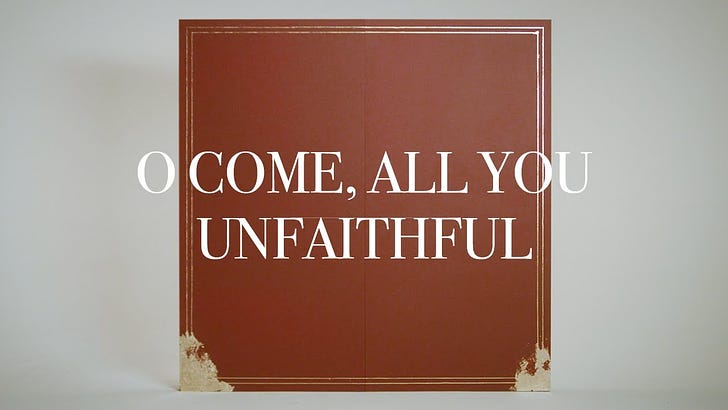As is so often the case when my colleague and I come to our morning devotionals, the piece speaks into the very space that we've been contemplating. And so it was the same today.
A Tuesday, that for me at least, had a Monday feel about it, following my long weekend break to celebrate my wife's 40th Birthday.
My colleague and I had been chatting about the impossible standards that we set for ourselves and for each other. None more so than in pursuit of that perfect Christmas. Our devotion was about that very same thing. It included this song, O Come All You Unfaithful.
O come, all you unfaithful
Come, weak and unstable
Come, know you are not alone
O come, barren and waiting ones
Weary of praying, come
See what your God has done
Christ is born, Christ is born
Christ is born for you
O come, bitter and broken
Come with fears unspoken
Come, taste of His perfect love
O come, guilty and hiding ones
There is no need to run
See what your God has done
Christ is born, Christ is born
Christ is born for you
Over the weekend, one of the places we went to in Bristol was, the cinema. To watch, Wicked. Part one of the screen version of the stage show. For me, it brought up some really interesting thoughts about goodness and wickedness.
First wickedness,
Munchkinland Kid: Miss Glinda, why does wickedness happen?
Glinda: That's a good question. Are people born wicked? Or do they have wickedness thrust upon them? Afterall, The Wicked Witch had a childhood. She had a father, who, by the way, had been appointed governor of Munchkinland. And she had a mother, as so many do.
And goodness,
Shiz Students: [singing about Elphaba] Dear Galinda, you are just too good! How do you stand it? I don't think I could! She's a terror! She's a tartar! We don't mean to show a bias, but Galinda you're a martyr!
Glinda: [belting] Well... these things are sent to try us!
I have much more to ponder on this. And talking about pondering. I couldn't help but overhear a very loud conversation between two psychiatrists over lunch. They were talking about belief. About Christianity and Christmas and Church. After finishing my lunch, and enjoying the eavesdropped conversation, I introduced myself.
They hadn't heard about the spirituality and psychiatry special interest group at the Royal College of Psychiatry, so I also introduced them to it.
https://www.rcpsych.ac.uk/members/special-interest-groups/spirituality
The mind is endlessly fascinating.
A lady, who we've been visiting regularly, described how last year she was also in hospital for Christmas. Anticipating the same this year for herself, she proceeded to tell us about how great it was. I mean, not ideal, but in company, singing carols, presents given. Not too bad. As she described the experience, she really sold it to me and I said she'd made me consider being here for Christmas.
Now, of course, I'm not suggesting I really want that but it is interesting how the mind works with good and bad. Instead of just a combination of both. A mix.
In Malcolm Guite's, Waiting On The Word, a collection of poems for Advent, Christmas and Epiphany, Guite begins seven days of his own sonnets, to mark the seven O Antiphons.
Interestingly, they all, like the title of the song and its associated and more familiar Carol, begin with this interjection, ‘O’. An appeal. An invitation. A summons. A request.
O Sapientia
I cannot think unless I have been thought,
Nor can I speak unless I have been spoken.
I cannot teach except as I am taught,
Or break the bread except as I am broken.
O Mind behind the mind through which I seek,
O Light within the light by which I see,
O Word beneath the words with which I speak,
O founding, unfound Wisdom, finding me,
O sounding Song whose depth is sounding me,
O Memory of time, reminding me,
My Ground of Being, always grounding me,
My Maker’s Bounding Line, defining me,
Come, hidden Wisdom, come with all you bring,
Come to me now, disguised as everything.
—Malcolm Guite
Fittingly, the subject of this sonnet, is the mind and wisdom. It would have nestled well in the psychiatrists conversation.
Malcolm Guite goes on to explain his poem by saying,
The whole purpose of Advent is to be for a moment fully and consciously Before Christ. In that place of darkness and waiting, we look for his coming and do not presume too much that we already know or have it.
It's a most precious call.
I am drawn to find the wonder and mystery in what Guite goes on to describe as,
I would still need someone to come… I would need a gift of Wisdom, I would need a Light, a King, a Root, a Key, a Flame…
How about you?
What might you identify that you need?
I've learnt a lot today. I've gleaned much wisdom. I've been impressed by simplicity. By lack.
By potential.
By not having it all together.
By falling apart and picking up the pieces.
By longing and looking.
By calling and listening for the response.



